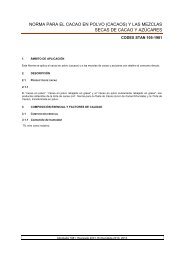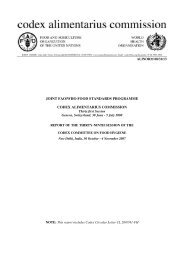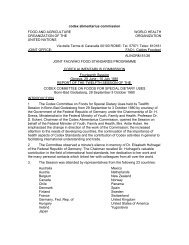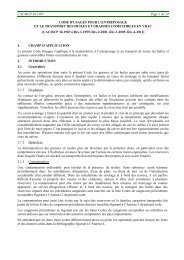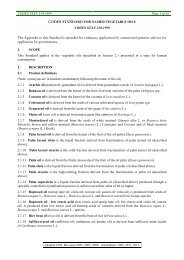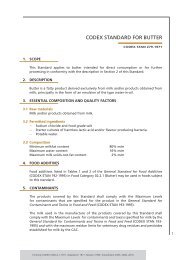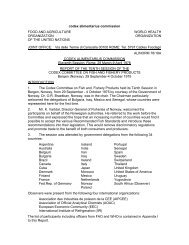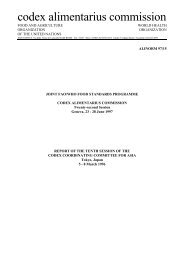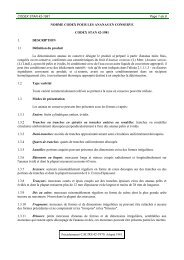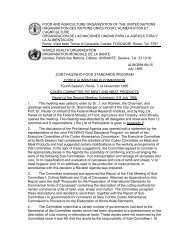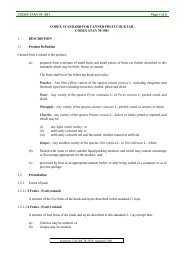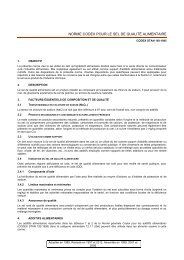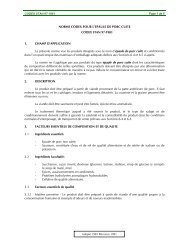REP13/FH JOINT FAO/WHO FOOD STANDARDS PROGRAMME ...
REP13/FH JOINT FAO/WHO FOOD STANDARDS PROGRAMME ...
REP13/FH JOINT FAO/WHO FOOD STANDARDS PROGRAMME ...
You also want an ePaper? Increase the reach of your titles
YUMPU automatically turns print PDFs into web optimized ePapers that Google loves.
<strong>REP13</strong>/<strong>FH</strong> 1<br />
INTRODUCTION<br />
1. The Codex Committee on Food Hygiene (CC<strong>FH</strong>) held its Forty-fourth Session in New Orleans, United<br />
States of America, from 12 - 16 November 2012, at the kind invitation of the Government of the United<br />
States of America. Dr Emilio Esteban, of the United States of America, chaired the Session. The Session<br />
was attended by 207 delegates representing 73 member countries, one member organization and 16<br />
international organizations including <strong>FAO</strong> and <strong>WHO</strong>. A complete list of participants, including the<br />
Secretariats, is attached as Appendix I.<br />
OPENING OF THE SESSION<br />
2. The Session was opened by Ms Karen Stuck, US Codex Manager.<br />
3. The Committee was addressed by Ms Charlotte Parent, Deputy Director of Health, City of New<br />
Orleans. Ms Parent told the delegates that food was very important to New Orleans, noting the city’s<br />
reputation as a centre of great food and great culture. Ms Parent talked about how Hurricane Katrina<br />
provided the catalyst for the transformation of the New Orleans Department of Public Health from one that<br />
focused on safety net services to one that focused on the issues that affect health of the community as a<br />
whole, such as childhood obesity and physical activity.<br />
4. Mr Brian Ronholm, Deputy Under Secretary, Office of Food Safety, U.S. Department of Agriculture,<br />
also addressed the delegates. Mr Ronholm expressed his gratitude for the moral and financial support that<br />
New Orleans contributed to the victims of Hurricane Sandy, both in the United States of America and the<br />
Caribbean. He mentioned the Panel discussion, “Codex at 50: Past Accomplishment and Future<br />
Challenges” that would be held during the session. In his talk, he highlighted the changes in Codex over the<br />
past 50 years, but stressed that the goals of Codex have remained the same: to provide member countries<br />
with an effective way to protect the health of consumers and to ensure fair practices in the food trade.<br />
Mr Ronholm also remarked on the relationship between safe food and the ability to trade. He said that<br />
Codex provides a valid way for food safety professionals and regulatory authorities to make good decisions<br />
that are in the best interest of producers, distributors and consumers.<br />
Division of Competence<br />
5. The Committee noted the division of competence between the European Union and its Member<br />
States, according to paragraph 5, Rule II of the Procedure of the Codex Alimentarius Commission, as<br />
presented in CRD 1.<br />
ADOPTION OF THE AGENDA (Agenda Item 1) 1<br />
6. The Committee adopted the Provisional Agenda as its Agenda for the Session and agreed to:<br />
Establish in-session working groups on:<br />
o Endorsement of the hygiene provisions in the Code of Practice for Street-vended Foods (Near<br />
East), led by Australia and working in English, French and Spanish, to consider comments<br />
submitted and make recommendations for the Plenary; and<br />
o Proposed draft Guidelines for Control of Specific Zoonotic Parasites in Meat: Trichinella spp. and<br />
Cysticercus bovis, led by the European Union and New Zealand and working in English, French<br />
and Spanish, to consider comments submitted and make recommendations for the Plenary.<br />
Consider the Agenda Items in the following order: 1, 2a, 3a, 3b, 7, 4, 6, 8 (a, b, c), 2b, 5 and 9.<br />
MATTERS REFERRED BY THE CODEX ALIMENTARIUS COMMISSION AND/OR OTHER CODEX<br />
COMMITTEES TO THE <strong>FOOD</strong> HYGIENE COMMITTEE (Agenda Item 2a) 2<br />
7. The Committee noted the information presented in CX/<strong>FH</strong> 12/44/2.<br />
DRAFT REGIONAL CODE OF PRACTICE FOR STREET-VENDED <strong>FOOD</strong>S (NEAR EAST)<br />
(Agenda Item 2b) 3<br />
8. In accordance with its terms of reference, the Committee considered the hygiene provisions in the<br />
draft Regional Code or Practice for Street-Vended Foods, developed by the <strong>FAO</strong>/<strong>WHO</strong> Coordinating<br />
Committee for the Near East (CCNEA), for endorsement.<br />
1<br />
2<br />
3<br />
CX/<strong>FH</strong> 12/44/1.<br />
CX/<strong>FH</strong> 12/44/2.<br />
CL 2012/1-<strong>FH</strong>, comments of Australia (CX/<strong>FH</strong> 12/44/3); India, Malaysia and Nicaragua (CX/<strong>FH</strong> 12/44/3-Add.1);<br />
Ghana, Kenya, Senegal and IACFO (CX/<strong>FH</strong> 12/44/3-Add.2); Uganda (CRD 6); Jamaica (CRD 12); South Africa<br />
(CRD 14); Peru (CRD 18); report of in-session working group on endorsement (CRD 26).



